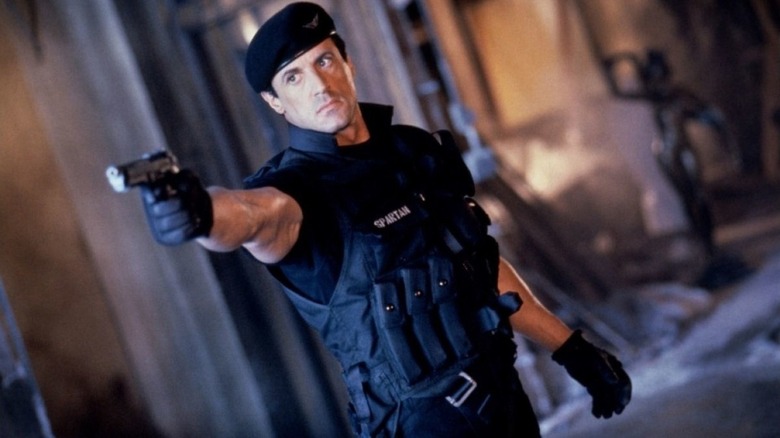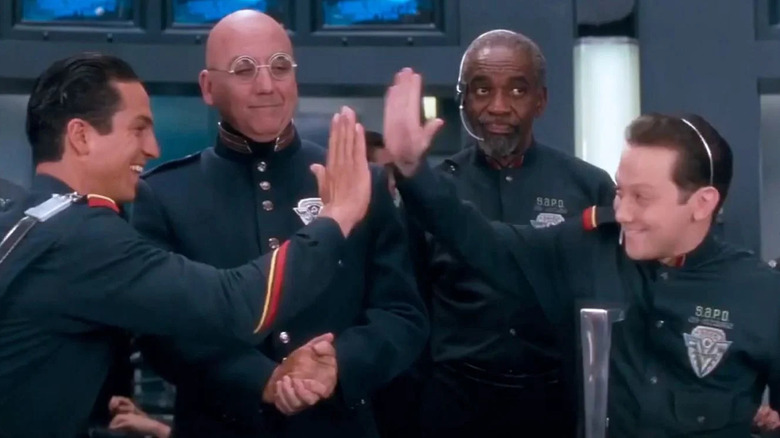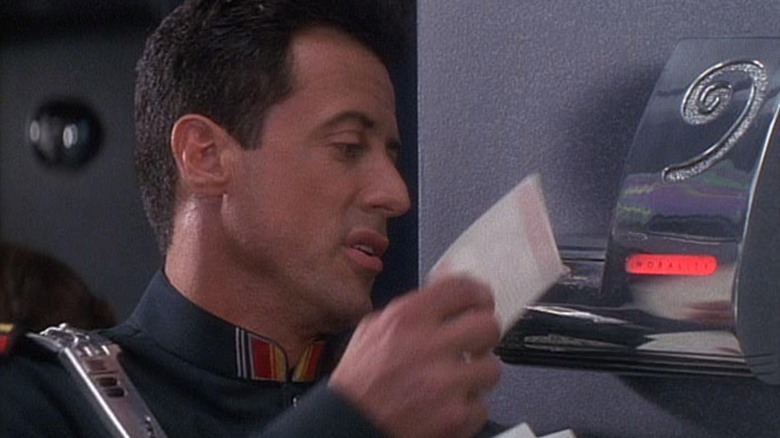Demolition Man's Writer Daniel Waters Never Intended For It To Be Prophetic
The last few years have been ... strange, to say the least. So, when movies from the past that were set in the future get some of it right, it's pretty impressive. Sadly, the 2006 comedy "Idiocracy" is often cited as such a film, prompting The Guardian to call it "a disturbingly prophetic look at the future of America." And the 1993 sci-fi action film "Demolition Man" painfully resonates with an increasingly accurate picture of our present day.
In 1996, legendary L.A. police Sergeant John Spartan (Sylvester Stallone), known as the "demolition man" because of his penchant for exploding things while apprehending criminals, is charged with the manslaughter of 30 innocent citizens after a building blows up during a confrontation with his criminal arch-nemesis Simon Phoenix (Wesley Snipes). Both are cryogenically frozen for the duration of their sentence. When Phoenix is unfrozen in 2032 for a probation hearing and escapes, the now passive L.A.P.D. must unfreeze Spartan to help catch Phoenix for a second time.
While we're far from the 2032 utopian setting of "Demolition Man," there are a striking number of things about the future that the film got right. While the notion of a non-violent society seems laughable at this point, there are plenty of other narrative elements that have become a reality since the film was made — so much so that "Demolition Man" screenwriter Daniel Waters has said that he never meant for the film to predict the future, he was just having fun with the script. It's not his fault so much of it came true.
It predicted the pandemic and then some
"Demolition Man" imagines a world post-pandemic, and what it might mean for society. A rash of diseases and pandemics creates a society that eschews physical contact, which also leads to some rather cold, formal greetings. Handshakes are replaced by pantomimed circling of hands near each other. Upon John Spartan's thawing, an officer says hello to the legendary cop by holding up a hand and saying, "Sir, I formally convey my presence." Because the exchange of bodily fluids is outlawed, sex has become a virtual experience rather than physical, described as a digital transference of sexual energies. Indeed, with Sars, Bird Flu, Ebola, Covid-19, and now even Monkey Pox, the 21st century has not been kind when it comes to disease and illness. Exactly how many pandemics would it take to push us to a "Demolition Man" society? No kissing? Virtual sex? Social distancing in the name of public health is one thing, but no hugs for a loved one or physical contact with a partner seems like a big leap. Let's hope so, anyway.
The film also mirrors the way we communicate in a post-pandemic world. Covid-19 had many of us working from home, a trend that continues as companies harness the power of video conferencing. In "Demolition Man" it is standard fare to make phone calls via video chat. A scene with the architect of the new society, Dr. Raymond Cocteau (Nigel Hawthorne), looks just like a modern-day conference call as Cocteau sits in a board room chatting with a series of video monitors rather than people physically present at the table.
Utopia isn't all that great
"Demolition Man" is a creative examination of what we might have to sacrifice to live in a utopian society. In addition to the exchange of bodily fluids, anything "bad" for you is illegal, including (per the movie, not necessarily this writer's opinion) smoking, alcohol, contact sports, meat, caffeine, chocolate, gasoline, non-educational toys, swearing, and anything spicy. While these bans seem ridiculous, it doesn't seem all that long ago when passengers could light up a cigarette on an airplane. As the owner of a sensitive palate, I have to admit I could get behind a proposal from the American Gastroenterological Association to make spicy food illegal. But chocolate? Apparently some tough decisions have to be made on the way to utopia.
"Demolition Man" screenwriter Daniel Waters had no intentions on predicting the future and has rejected some wild interpretations of the movie. In an interview with Vulture, Waters explains that he was hired to rewrite the existing "Demolition Man" script, injecting it with humor and biting takes on popular culture. It certainly wasn't meant to be taken as a political statement or any kind of manifesto for the future. Waters said:
"Somebody linked me to this die-hard, I'll put it charitably, libertarian guy who wrote, 'Actually, Demolition Man is the great thesis statement of the '90s.' It's like, whoa, whoa. What, am I going to be Mr. Anti-Politically-Correct now? No, just having a little fun."
From smart homes and Arnold Schwarzenegger the politician to a socially distanced society, Waters did get a lot of the future right. But we're still a long way from the "utopian" society presented in "Demolition Man," and that might be a good thing.


